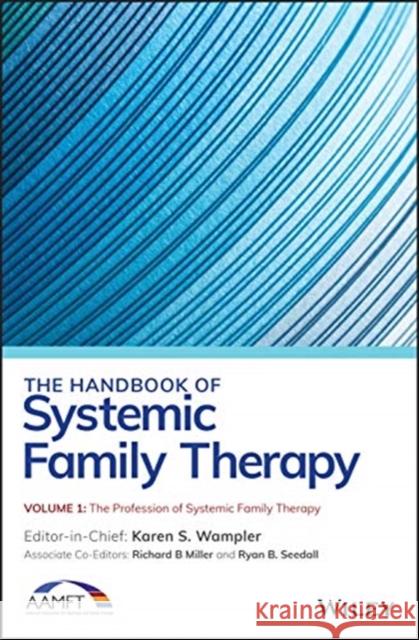The Handbook of Systemic Family Therapy, the Profession of Systemic Family Therapy » książka



The Handbook of Systemic Family Therapy, the Profession of Systemic Family Therapy
ISBN-13: 9781119702061 / Angielski / Twarda / 2020 / 840 str.
The Handbook of Systemic Family Therapy, the Profession of Systemic Family Therapy
ISBN-13: 9781119702061 / Angielski / Twarda / 2020 / 840 str.
(netto: 717,34 VAT: 5%)
Najniższa cena z 30 dni: 731,48 zł
ok. 22 dni roboczych.
Darmowa dostawa!
About the Editors xiThe Handbook of Systemic Family TherapyList of Contributors xvPreface xxixVolume 1 Preface xxxiiThe Profession of Systemic Family TherapyForeword xxxvPart I Foundations 11 The Importance of Family and the Role of Systemic Family Therapy 3Karen S. Wampler and Jo Ellen Patterson2 The Evolution and Current Status of Systemic Family Therapy: A Sociocultural Perspective 33William J. Doherty3 Global Contexts for the Profession of Systemic Family Therapy 51Timothy Sim and Charles Sim4 Redefining "Family:" Lessons From Multidisciplinary Research with Marginalized Populations 79Heather McCauley and Morgan E. PettyJohn5 Systems Theory and Methodology: Advancing the Science of Systemic Family Therapy 97Andrea K. Wittenborn, Niyousha Hosseinichimeh, Jennifer L. Rick, and Chi-Fang Tseng6 Evidence for the Efficacy and Effectiveness of Systemic Family Therapy 119Alan Carr7 Common Factors Underlying Systemic Family Therapy 147Eli A. Karam and Adrian J. Blow8 The Process of Change in Systemic Family Therapy 171Nathan R. Hardy, Allen K. Sabey, and Shayne R. Anderson9 Physiological Considerations in Systemic Family Therapy: The Role of Internal Systems in Relational Contexts 205Angela B. Bradford and Eran Bar-KalifaPart II Social and Cultural Contexts 22510 Intersectionality: A Liberation-Based Healing Perspective 227Rhea V. Almeida and Carolyn Y. Tubbs11 Sexual Orientation and Gender Identity: Considerations for Systemic Therapists 251Christi R. McGeorge, Ashley A. Walsdorf, Lindsay L. Edwards, Kristen E. Benson, and Katelyn O. Coburn12 Spiritual and Religious Issues in Systemic Family Therapy 273Renu K. Aldrich and Sarah A. CrabtreePart III Theoretical Perspectives 29313 Theory: The Heart of Systemic Family Therapy 295Stephen T. Fife14 Transgenerational Theories and How They Evolved into Current Research and Practice 317Terry D. Hargrave and Benjamin J. Houltberg15 Structural and Strategic Approaches 339Jeffrey B. Jackson and Ashley L. Landers16 Behavioral and Cognitive-Behavioral Approaches in Systemic Family Therapy 365Norman B. Epstein and Frank M. Dattilio17 Attachment and Other Emotion-Based Systemic Approaches 391Ryan B. Seedall and Jonathan G. Sandberg18 Postmodern Family Therapy 417Ronald J. Chenail, Michael D. Reiter, Maru Torres-Gregory, and Dragana IlicPart IV Methodological Challenges and Advances 44319 Innovations in Systemic Family Therapy Effectiveness Research 445Richard B Miller and Matthew E. Jaurequi20 Process Research: Methods for Examining Mechanisms of Change in Systemic Family Therapies 467Lee N. Johnson, Laura M. Evans, Brian R. W. Baucom, and Jason B. Whiting21 Community-Based Participatory Research (CBPR) for Underserved Populations 491Rubén Parra-Cardona, Hydeen K. Beverly, and Gabriela Lopez-Zerón22 Implementing Research into Everyday Systemic Family Therapy Practice 513Mathew C. Withers and James Michael DuncanPart V Training and Practice 53123 Ethical and Legal Issues Unique to Systemic Family Therapy 533Megan J. Murphy and Lorna L. Hecker24 Training and Credentialing in the Profession of Marriage and Family Therapy 555Kevin P. Lyness25 Supervision in Systemic Family Therapy 577Marj Castronova, Jessica ChenFeng, and Toni Schindler Zimmerman26 Multilevel Assessment 601Todd M. Edwards, Lee M. Williams, Jenny Speice, and Jo Ellen Patterson27 Sociocultural Attunement in Systemic Family Therapy 619Carmen Knudson-Martin, Teresa McDowell, and J. Maria Bermudez28 Promoting Innovative Systemic Research through Improved Graduate Training 639Jared A. Durtschi, Suzanne Bartle-Haring, and Amber Vennum29 Systemic Family Therapy in Medical Settings 659W. David Robinson, Adam C. Jones, Daniel S. Felix, and Douglas P. McPhee30 Specialty Settings: Hospital-Based Behavioral Health, Military, Family Businesses, Management, and Government 683Brian Distelberg, Elsie Lobo, and Griselda Lloyd31 Integration of New Technologies in Assessment, Research, and Treatment Delivery 705Richard J. Bischoff, Paul R. Springer, and Nathan C. TaylorPart VI Future Directions 72732 The Importance of Policy and Advocacy in Systemic Family Therapy 729Jennifer Hodgson and Angela L. Lamson33 The Future of Systemic Family Therapy: What Needs Nurturing and What Does Not 753Fred P. PiercyIndex 771
Karen S. Wampler, PhD, retired as Professor and Chair of the Human Development and Family Studies department at Michigan State University. She previously served as Department Chair, Marriage and Family Therapy (MFT) Program Director, and the C. R. and Virginia Hutcheson Professor at Texas Tech University. Prior to that, she developed and directed the MFT Program at the University of Georgia. Her research focused on applying attachment theory to couple interaction, family therapy process research, and observational measures of relationships. A past editor of the Journal of Marital and Family Therapy, she received the AAMFT Contribution to MFT, NCFR Distinguished Service to Family Therapy, and NCFR Kathleen Briggs Mentor Awards.Richard B Miller, PhD, is Chair of the Sociology Department, a former Director of the School of Family Life, and a former Associate Dean in the College of Family, Home, and Social Science at Brigham Young University (BYU). He is also a professor in the Marriage and Family Therapy (MFT) Program at BYU. Prior to teaching at BYU, he taught at Kansas State University for 11 years, serving as Director of the MFT Program. His program of research focuses on therapist effects and qualities of effective therapists. He has published over 100 journal articles and book chapters, and, along with Lee Johnson, edited Advanced Methods in Marriage and Family Therapy Research.Ryan B. Seedall, PhD, is associate professor in the Marriage and Family Therapy Program at Utah State University, having received his training from Brigham Young University (MS) and Michigan State University (PhD). He is an AAMFT Approved Supervisor and Clinical Fellow. His research focuses on understanding and improving relationship and change processes through examining interaction and support processes. He is also interested in protective family dynamics and prevention, including ways to reduce mental health disparities. He has conducted research on identifying specific interventions that are useful when working with couples (e.g., enactments) and therapist- and client-related factors that are strongly associated with process and outcome in therapy.
1997-2024 DolnySlask.com Agencja Internetowa
KrainaKsiazek.PL - Księgarnia Internetowa









